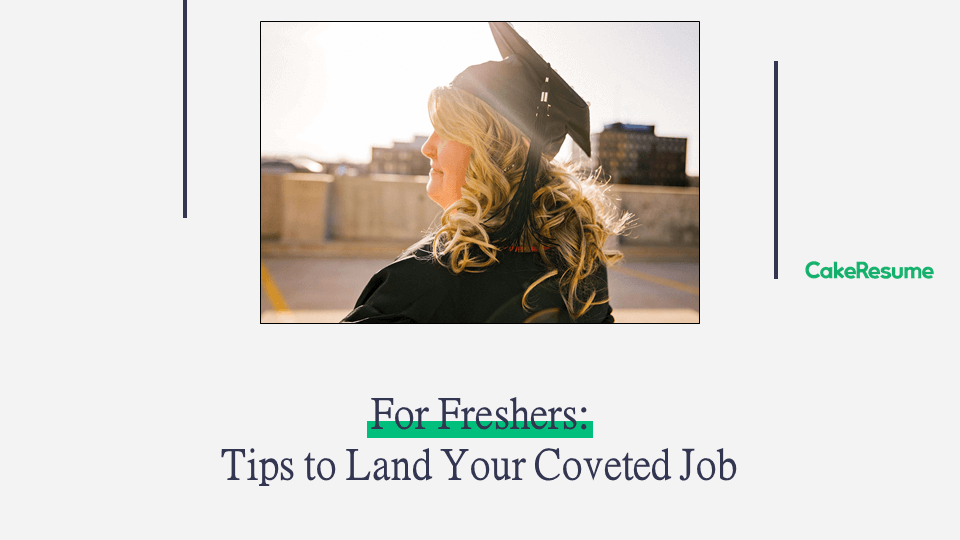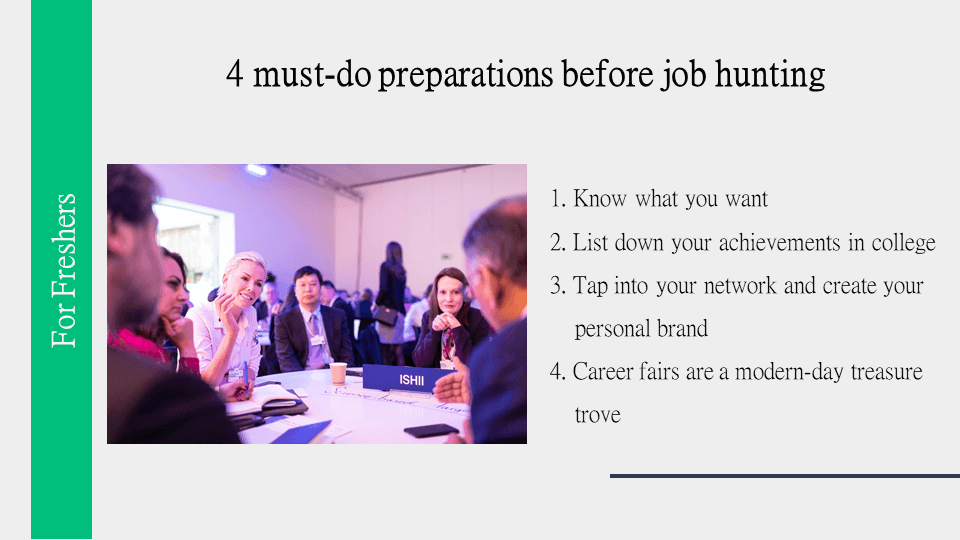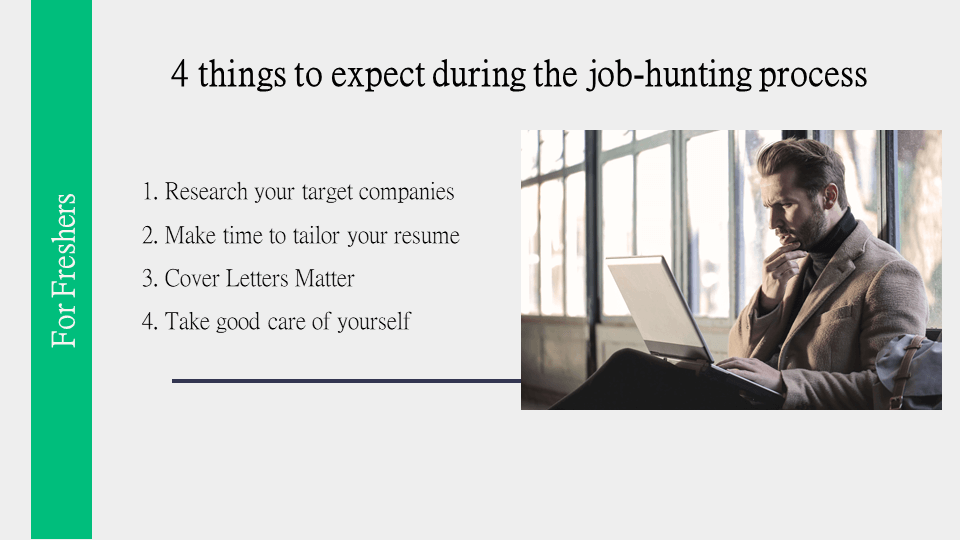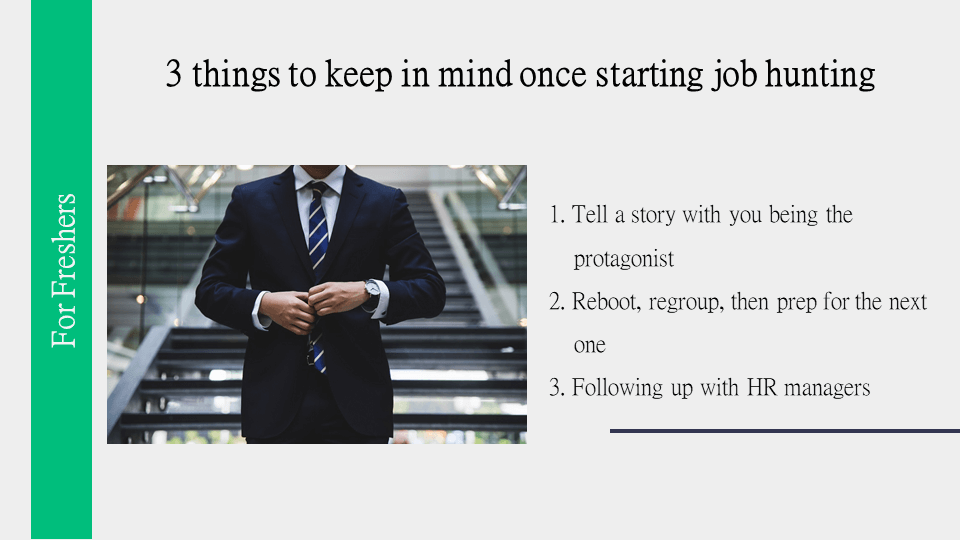For Freshers: Tips to Land Your Coveted Job

Finding a job— conundrum for fresh graduates
I’ve watched enough YouTube videos to know that most of you 22-year-old have resolved to do now that you’ve graduated: take good care of yourself both mentally and physically; do good for Mother Earth; find a life partner (no one’s asking but I personally prefer animals to human company, thank you very much); further develop your talents; find what you’re passionate about and turn it into your job; become highly regarded in your profession, etc..
22 is such an awkward age isn’t it? You’ve spent roughly 15 years studying, slowly accumulating a great deal of knowledge but at the same time, you’ve just set sail on uncharted waters (i.e. job-hunting), creating a hotbed of panic and ambition that has become your greatest nightmare. But fear not fellow fresh grads, I will delve more into the career aspect to help you plan your perfect life after college.
Let me tell you a little secret, you’re not actually completely starting from scratch. Even though you have no prior job experience, this 3-part article will help you appear to be an “experienced fresher,” and assist you in landing your most coveted jobs.

4 must-do preparations before you begin looking for a job
1. Know what you want
First and foremost, you should have a clear understanding of where your passion lies. Your college degree doesn’t determine your future; in fact, it might take you four years to realize that your true calling is completely unrelated to your major. It’s okay to go off the beaten path as long as you have a concrete goal in mind and put in enough effort to make it happen. Don’t settle, as it will just be a waste of time. You have to decide which direction to take before embarking on your new journey.
If you don’t want to dive head-first into the job market/hunt, you can cut yourself some slack and chill for a while. Being all stressed won’t help you find a job.
2. List down your achievements in college
I call it resume 1.0, but it’s actually more like a script. It can be a three or four pager wherein you jot down the whole shebang, not only activities that helped you develop your soft skills (e.g. leadership, interpersonal skills, and other character or personality traits), but also include your volunteer work, internships, strengths and even weaknesses— but don’t forget to explain how you would turn them into your strong suit! You can also add relevant stories to support your claims. Better yet, describe how a certain soft skill made it easier for you to learn a particular hard skill.
What makes this time-consuming step worth it is that you end up with a tailored resume— essentially an amalgamation of all your experiences and accomplishments— that will definitely come in handy once you start job-hunting.
I know it may sound like a conundrum for many, but I can guarantee that going through this helps you tell a persuasive story with you as the protagonist, helping you create a CV that oozes with personality and that shows off your strong suit. It helps highlight how much value you can add to the company of your choice.
3. Tap into your network and create your personal brand
Aside from resumes and cover letters, setting up your online brand presence can boost your visibility without much effort. Think: a profile on Linkedin, a personal page on CakeResume, or a blog on Medium. If you’re an engineer, GitHub is also a great place to compile and display your certifications and projects. That being said, writing a post on Facebook might also prove to be rewarding.
These are imperative in curating your online presence, but most importantly, these platforms allow you to seem like an “experienced fresh grad.” You’re showing the HR managers that you’ve been investing in yourself and are more than ready to enter the workforce. For offline strategies, don’t be shy to let your friends and family know you’re looking for a job— some great opportunities can still be seized the traditional way.
4. Career fairs are a modern-day treasure trove
Career fairs offer a lot of underlying opportunities. Some colleges focus more on certain industries, so I suggest that you research thoroughly which companies are participating first. Next, go visit different career fairs, some great opportunities might pop up!
You don’t necessarily have to apply for jobs at this point, but I think it’s a great way to understand the latest trends in the industry, and discover what soft skills are highly sought-after. Who knows, you might run into your future manager in one of the career fairs!

4 things to expect during the job-hunting process
1. Research your target companies
Recently, I read a post entitled“ A daily routine to find a job” on LinkedIn. When I finished, I realized we may have to go through many trials and tribulations before we can get a job. The author mentioned that the secret to landing your dream job is to treat job hunting as a job until you get it. A lot of people underestimate this attitude, and might think it’s not that big of a deal, but hey, you had your fair share of “joie de vivre” in college, so it’s time to get down to business and possess the right mindset in order to find a job. The search is akin to a war of attrition, you need a strong mind on top of putting in a lot of effort, so make sure you’re fully prepared for it.
After you understand fully what you want, list down some of your ideal companies and keep an eye on their job listings. Focusing on specific companies rather than vacancies can work in your favor. You can send your CV and cover letter directly to the company instead of submitting an application just because there’s a job up for grabs.
Job Search Pro Tip
You can keep a track of the jobs you’ve applied for, companies that have invited you for interviews, questions you want to ask, and more by using a simple and organized spreadsheet.
2. Make time to tailor your resume
Remember the part where I asked you to explicitly write down all your achievements? It’s finally time to piece together your one-of-a-kind resume!
I don’t recommend sending a one-template-fits-all resume to all the companies you’re targeting. Rather, align your skills with the job descriptions listed by the companies. Make sure that your resume looks professional but not boring, and polished yet endearing. A memorable and likable candidate always goes the distance.
Since you’ve already prepared all the necessary materials, it’ll be easy to strike a balance between quantity and quality, saving you valuable time for something even more important that will be revealed in the next part.
Job Search Pro Tip
Use the almighty spreadsheet to record the job descriptions of your ideal positions.
3. Cover Letters Matter
While mostly considered unnecessary and “nice-to-have”, cover letters will earn you bonus points if you took the time to add a tailored one with your application. Some companies, however, use cover letters to vet candidates, so “optional” cover letters aren’t so optional after all if you’re serious about the job. Moreover, 53% of employers don’t think a resume is enough regardless of the position, be it full-time, part-time employment or even an internship.
Here are a few tips to make your cover letter stand out:
- Describe how you’ll add value to the company once hired. Again, elaborate on the details mentioned on your resume as it helps to differentiate you from the other candidates with similar qualifications.
- Highlight your skills, professional prowess, achievements and projects to prove that you’ll be a valuable hire.
- For fresh graduates like you, persuade the company that your experiences in college and internships can translate to success in the new role.
- Matching the design with your resume. It might seem to be a small detail but it gives off the impression of a well-thought of application— this may be what seals the deal!
These are tried-and-tested tips that will help send you on your merry way!
4. Take good care of yourself
It may take a couple months before you land your desired job so understandably, your stress levels might be through the roof. Trust me when I tell you that it’s not easy to lead a life when your mood is fluctuating all the time while waiting for interview invitations or rejection emails.
Here are a few things I learned from YouTube and real-life experiences that help alleviate anxiety.
- Go for a run— nothing can replicate exercise-induced endorphins. A brisk walk around the block can also do wonders!
- Get back to nature, space out and breathe in the fresh air— these help soothe your nerves so you’ll feel serene in no time.
- Relax— don’t let job-hunting wreak havoc on your life. After all, you’re just at the starting point.

3 things to keep in mind once you start applying for jobs
1. Tell a story with you being the protagonist
Congratulations, you’ve finally received interview invitations from your dream companies! In preparing for the impending interview, practicing through mock-interviews is a must, so that you’ll be ready for the commonly asked questions.
Aside from this, you need to come up with stories that will pique the HR manager’s or the upper management’s interests— these have to visibly showcase your skills, prowess, and passion for the required work. Tell your stories in vivid and engaging ways that are easy to understand. That’s one of the ways that will help you qualify as a candidate for a company.
2. Reboot, regroup, then prep for the next one
You won’t be just going through one interview. Candidates often go through three to five rounds before receiving a job offer. Multiply that by the number of positions you’ve applied for!
Even if you don’t make it to the next round, you’ve now gained experience and the chance the learn from your mistakes. Analyze and replay your previous interviews, recall your body language, answer the questions you were asked again and continue fine-tuning your resume. This makes you more prepared for the next one.
3. Following up with HR managers
Thank you notes can work wonders. Your interview doesn’t end the moment you walk out of the office, so send a follow-up letter or a thank you note to the company to remind them of you. Trust me, others will pale by comparison.
Quick reminder: if you’ve been communicating with the HR manager through emails, replying promptly without being needy or pesky is a small yet considerate gesture.
Closing Thoughts
I hope this comprehensive guide sends all the fresh grads out there to a good start and has given everyone a clear idea as to how to prepare and what to expect. Remember that finding a job can be a long and arduous journey where you might even doubt yourself in the process. But as long as you follow these tips, you will become an “experienced fresh grad” who has successfully escaped the trap of the Permission Paradox (you can’t find a job without experience but you also can’t get any experience without first getting a job).
Good luck with your job hunting! May the odds be ever in your favor.
Further reading : 3 Tips to Write a Professional Resume for Freshers Just Out of College
More Career and Recruitment Resources

Annie is currently a translation and interpretation graduate student who spends most of her time at home surrounded by books and freshly-made food. Whenever she yearns for nature, she’d hop on a bus or ride a bike to the nearest park where she would proceed to empty her mind and call it a day.






